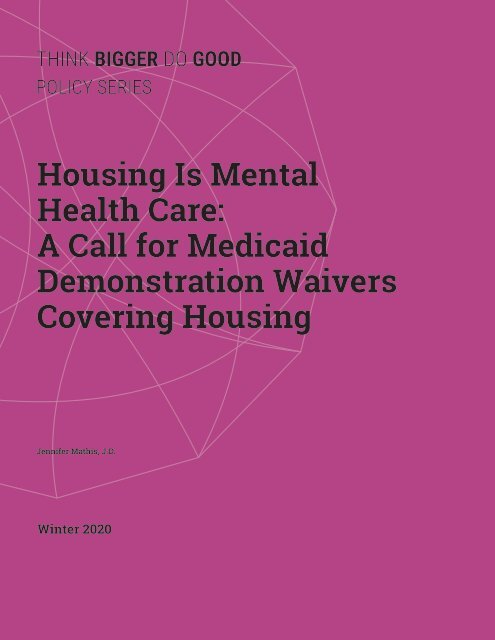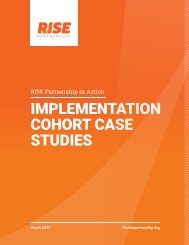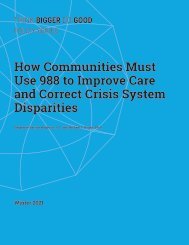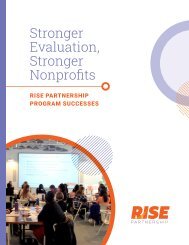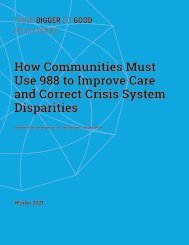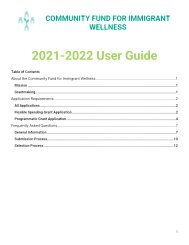Housing is Mental Health Care
Create successful ePaper yourself
Turn your PDF publications into a flip-book with our unique Google optimized e-Paper software.
THINK BIGGER DO GOOD<br />
POLICY SERIES<br />
<strong>Housing</strong> Is <strong>Mental</strong><br />
<strong>Health</strong> <strong>Care</strong>:<br />
A Call for Medicaid<br />
Demonstration Waivers<br />
Covering <strong>Housing</strong><br />
Jennifer Math<strong>is</strong>, J.D.<br />
Winter 2020<br />
<strong>Housing</strong> Is <strong>Mental</strong> <strong>Health</strong> <strong>Care</strong>: A Call for Medicaid Demonstration Waivers Covering <strong>Housing</strong> 1
Behavioral <strong>Health</strong> and the Individual <strong>Health</strong> Insurance Market
Dear Reader,<br />
Now <strong>is</strong> the time to solve the growing behavioral health needs in our country by advancing public<br />
policies that transform the delivery of mental health and substance use d<strong>is</strong>order services and address<br />
outdated funding mechan<strong>is</strong>ms.<br />
Th<strong>is</strong> paper <strong>is</strong> part of Think Bigger Do Good, a series of papers launched in 2017 through the support and<br />
leadership of the Thomas Scattergood Behavioral <strong>Health</strong> Foundation and Peg’s Foundation. While the<br />
paper topics continue to evolve, our goal to develop a policy agenda to improve health outcomes for all<br />
remains constant.<br />
In partnership with national experts in behavioral health, including our editors, Howard Goldman<br />
and Constance Gartner, we identified seven critical topics for th<strong>is</strong> third series of papers. Each paper<br />
identifies the problem and provides clear, actionable solutions.<br />
We hope you join us in advocating for stronger behavioral health policies by sharing th<strong>is</strong> paper with<br />
your programmatic partners, local, state, and federal dec<strong>is</strong>ion makers, advocacy organizations, and<br />
voters. To learn more about Think Bigger Do Good and to access the other papers in the series, v<strong>is</strong>it<br />
www.thinkbiggerdogood.org<br />
Sincerely,<br />
Joseph Pyle, M.A.<br />
President<br />
Scattergood Foundation<br />
Founding Partner of Series<br />
Rick Kellar, M.B.A.<br />
President<br />
Peg’s Foundation<br />
Founding Partner of Series<br />
Jane Mogavero, Esq.<br />
Executive Director<br />
Patrick P. Lee Foundation<br />
Tracy A. Sawicki<br />
Executive Director<br />
Peter & Elizabeth Tower Foundation<br />
<strong>Housing</strong> Is <strong>Mental</strong> <strong>Health</strong> <strong>Care</strong>: A Call for Medicaid Demonstration Waivers Covering <strong>Housing</strong> 3
We would like to acknowledge the following individuals for their participation in<br />
the meeting that led to the conceptualization of the paper series.<br />
Colleen L. Barry, Ph.D., M.P.P.<br />
John Hopkins Bloomberg School of<br />
Public <strong>Health</strong><br />
Cynthia Baum-Baicker, Ph.D.<br />
The Scattergood Foundation<br />
Anita Burgos, Ph.D.<br />
Bipart<strong>is</strong>an Policy Center<br />
Thom Craig, M.P.A.<br />
Peg’s Foundation<br />
Rebecca David, M.P.H.<br />
National Council for Behavioral <strong>Health</strong><br />
Kelly Dav<strong>is</strong><br />
<strong>Mental</strong> <strong>Health</strong> America<br />
L<strong>is</strong>a Dixon, M.D., M.P.H.<br />
Columbia University, NY State Psychiatric<br />
Institute, and Psychiatric Services<br />
Sara Dugan, Pharm.D., B.C.P.P., B.C.P.S.<br />
Northeast Ohio Medical University<br />
Peter Earley<br />
Author & Journal<strong>is</strong>t<br />
Alyson Ferguson, M.P.H.<br />
The Scattergood Foundation<br />
Richard Frank, Ph.D.<br />
Harvard Medical School<br />
Rachel Garfield, Ph.D., M.H.S.<br />
The Henry J. Ka<strong>is</strong>er Family Foundation<br />
Mary Giliberti, J.D.<br />
<strong>Mental</strong> <strong>Health</strong> America<br />
Aaron Glickman, B.A.<br />
Perelman School of Medicine,<br />
University of Pennsylvania<br />
Sherry Glied, Ph.D.<br />
NYU Wagner School of Public Service<br />
Howard Goldman, M.D., Ph.D.<br />
University of Maryland School<br />
of Medicine<br />
Pamela Greenberg, M.P.P.<br />
Association for Behavioral <strong>Health</strong><br />
and Wellness<br />
Kimberly Hoagwood, Ph.D.<br />
New York University School of Medicine<br />
Michael F. Hogan, Ph.D.<br />
Hogan <strong>Health</strong> Solutions<br />
Chuck Ingoglia, M.S.W.<br />
National Council for Behavioral <strong>Health</strong><br />
Rick Kellar, M.B.A.<br />
Peg’s Foundation<br />
Kelly Kelleher, M.D., M.P.H.<br />
The Research Institute at Nationwide<br />
Children’s Hospital<br />
Jennifer Math<strong>is</strong>, J.D.<br />
Bazelon Center for <strong>Mental</strong> <strong>Health</strong> Law<br />
Donald Matteson, M.A.<br />
Peter & Elizabeth Tower Foundation<br />
Brian McGregor, Ph.D.<br />
Satcher <strong>Health</strong> Leadership Institute,<br />
Morehouse College<br />
Erik Messamore, M.D.<br />
Northeast Ohio Medical University<br />
Ben Miller, PsyD<br />
Well Being Trust<br />
Jane Mogavero, Esq.<br />
Patrick P. Lee Foundation<br />
Mark R. Munetz, M.D.<br />
Northeast Ohio Medical University<br />
Sandra Newman, Ph.D.<br />
John Hopkins Bloomberg School of<br />
Public <strong>Health</strong><br />
Joseph Pyle, M.A.<br />
The Scattergood Foundation<br />
Barbara Ricci<br />
Center for High Impact Philanthropy<br />
Cheryl Roberts, Esq.<br />
Greenberger Center<br />
Victoria Romanda<br />
Peg’s Foundation<br />
Tracy A. Sawicki<br />
Peter & Elizabeth Tower Foundation<br />
Lloyd Sederer, M.D.<br />
NYS Office of <strong>Mental</strong> <strong>Health</strong>/Mailman<br />
School of Public <strong>Health</strong><br />
Dominic S<strong>is</strong>ti, Ph.D.<br />
Scattergood Program for Applied Ethics<br />
in Behavioral <strong>Health</strong> <strong>Care</strong> & Perelman<br />
School of Medicine at the University<br />
of Pennsylvania<br />
Andrew Sperling, J.D.<br />
NAMI<br />
Kate Williams, J.D.<br />
The Scattergood Foundation<br />
Glenda L. Wrenn, M.D., M.S.H.P.<br />
180 <strong>Health</strong> Partners<br />
<strong>Housing</strong> Is <strong>Mental</strong> <strong>Health</strong> <strong>Care</strong>: A Call for Medicaid Demonstration Waivers Covering <strong>Housing</strong> 4
Titles in the Paper Series<br />
Editors Howard Goldman, M.D., Ph.D., and Constance Gartner, M.S.W.<br />
America’s Opioid Epidemic<br />
Lloyd I. Sederer, M.D.<br />
Behavioral <strong>Health</strong> and the Individual <strong>Health</strong> Insurance Market: Preserving Key Elements of Reform<br />
Richard G. Frank, Ph.D. and Sherry A. Glied, Ph.D., M.A.<br />
Bringing Treatment Parity to Jail Inmates with Schizophrenia<br />
Mark R. Munetz, M.D., Erik Messamore, M.D., Ph.D., and Sara E. Dugan, Pharm.D., B.C.P.P., B.C.P.S.<br />
Coordinated Specialty <strong>Care</strong> for First-Ep<strong>is</strong>ode Psychos<strong>is</strong>: An Example of Financing for Specialty Programs<br />
L<strong>is</strong>a B. Dixon, M.D., M.P.H.<br />
Employing People with <strong>Mental</strong> Illness in the 21st Century: Labor Market Changes and Policy Challenges<br />
Richard G. Frank, Ph.D. and Sherry A. Glied, Ph.D., M.A.<br />
Fentanyl and the Evolving Opioid Epidemic: What Strategies Should Policymakers Consider?<br />
Colleen L. Barry, Ph.D., M.P.P.<br />
Improving Outcomes for People with Serious <strong>Mental</strong> Illness and Co-Occurring Substance Use<br />
D<strong>is</strong>orders in Contact with the Criminal Justice System<br />
Glenda L. Wrenn, M.D., M.S.H.P., Brian McGregor, Ph.D., and Mark R. Munetz, M.D.<br />
Informed Consent: A Policy Prescription for Communicating Benefit and R<strong>is</strong>k in State Medical Marijuana Program<br />
Erik Messamore, M.D., Ph.D., and Sara E. Dugan, Pharm.D.<br />
Integrating <strong>Mental</strong> <strong>Health</strong> and Addiction Treatment in General Medical <strong>Care</strong>: The Role of Policy<br />
Emma B. McGinty, Ph.D., M.S., and Gail L. Daumit, M.D., M.H.S.<br />
Medicaid’s Institutions for <strong>Mental</strong> D<strong>is</strong>eases (IMD) Exclusion Rule: A Policy Debate<br />
Jennifer Math<strong>is</strong>, J.D., Dominic A. S<strong>is</strong>ti, Ph.D. and Aaron Glickman, B.A.<br />
Meeting the Needs of Justice-Involved People with Serious <strong>Mental</strong> Illness within Community<br />
Behavioral <strong>Health</strong> Systems<br />
Natalie Bonfine, Ph.D., Amy Blank Wilson, Ph.D., L.S.W., and Mark R. Munetz, M.D.<br />
New Opportunities to Improve <strong>Mental</strong> <strong>Health</strong> Cr<strong>is</strong><strong>is</strong> Systems<br />
Michael F. Hogan, Ph.D., and Mathew L. Goldman, M.D., M.S.<br />
Redesigning Federal <strong>Health</strong> Insurance Policies to Promote Children’s <strong>Mental</strong> <strong>Health</strong><br />
Kimberly Hoagwood, Ph.D., Kelly Kelleher, M.D., M.P.H, and Michael F. Hogan, Ph.D.<br />
<strong>Housing</strong> Is <strong>Mental</strong> <strong>Health</strong> <strong>Care</strong>: A Call for Medicaid Demonstration Waivers Covering <strong>Housing</strong> 5
Policy and Practice Innovations to Improve Prescribing of Psychoactive Medications for Children<br />
Kelly J. Kelleher, M.D., M.P.H., David Rubin, M.D., M.S.C.E., Kimberly Hoagwood, Ph.D.<br />
Preventing Suicide Through Better Firearm Safety Policy in the United States<br />
Jeffrey W. Swanson, Ph.D.<br />
Suicide Is a Significant <strong>Health</strong> Problem<br />
Michael F. Hogan, Ph.D.<br />
The Current Medicaid Policy Debate and Implications for Behavioral <strong>Health</strong>care in the United States<br />
Rachel Garfield, Ph.D., M.H.S. and Julia Zur, Ph.D.<br />
Youth Suicide Is Increasing: Modest Actions Taken Now Can Save Lives<br />
Michael F. Hogan, Ph.D.<br />
New Opportunities to Improve <strong>Mental</strong> <strong>Health</strong> Cr<strong>is</strong><strong>is</strong> Systems<br />
Michael F. Hogan, Ph.D. and Mathew L. Goldman, M.D., M.S.<br />
Find the papers online at www.thinkbiggerdogood.org<br />
We are grateful for the partnership that allows th<strong>is</strong> paper and others to appear<br />
in Psychiatric Services, a peer-reviewed monthly journal of the American Psychiatric<br />
Association. Content can be viewed at ps.psychiatryonline.org.<br />
<strong>Housing</strong> Is <strong>Mental</strong> <strong>Health</strong> <strong>Care</strong>: A Call for Medicaid Demonstration Waivers Covering <strong>Housing</strong> 6
<strong>Housing</strong> Is <strong>Mental</strong><br />
<strong>Health</strong> <strong>Care</strong>:<br />
A Call for Medicaid<br />
Demonstration Waivers<br />
Covering <strong>Housing</strong><br />
Jennifer Math<strong>is</strong>, J.D.<br />
Deputy Legal Director and Director of Policy and Legal Advocacy<br />
Judge David L. Bazelon Center for <strong>Mental</strong> <strong>Health</strong> Law<br />
jenniferm@bazelon.org<br />
<strong>Housing</strong> Is <strong>Mental</strong> <strong>Health</strong> <strong>Care</strong>: A Call for Medicaid Demonstration Waivers Covering <strong>Housing</strong> 7
1<br />
Introduction<br />
<strong>Housing</strong> <strong>is</strong> a basic human need and a key social determinant of health. As state<br />
mental health systems have increasingly recognized, housing and housingrelated<br />
services are critical to enabling people with serious mental illnesses to live<br />
successfully in their communities. Yet mental health service systems have been<br />
reluctant to assume full responsibility for providing housing to these individuals,<br />
who are d<strong>is</strong>proportionately homeless. Unlike other essential communitybased<br />
services, housing cannot be covered under the Medicaid program, which<br />
guarantees states federal reimbursement for between 50% and 83% of the cost of<br />
services. Instead, service systems rely on federal housing ass<strong>is</strong>tance programs<br />
and, where available, on state or local housing subsidy programs.<br />
<strong>Mental</strong> health services systems could make<br />
housing more widely available if they could use<br />
Medicaid funds for housing.<br />
<strong>Mental</strong> health service systems could make housing more widely available if they<br />
could use Medicaid funds for housing. Although the Medicaid statute bars federal<br />
funding for “room and board,” over the past several years the federal government<br />
has granted to more than half the states Medicaid “demonstration waivers”<br />
that lift a similar statutory prohibition: the rule barring Medicaid payments for<br />
services to individuals ages 21 to 64 in psychiatric institutions, or the institutions<br />
for mental d<strong>is</strong>ease (IMD) exclusion. If these waivers were lawfully granted, there<br />
<strong>is</strong> no reason why the ban on “room and board” could not be similarly waived<br />
in demonstration projects. Both the IMD exclusion and the “room and board”<br />
exclusion bar federal Medicaid funds for those services; if one exclusion can<br />
be waived, so can the other. If demonstrations show that Medicaid financing<br />
for housing improves mental health outcomes and reduces use of more costly<br />
services, those results should spur a conversation about modifying Medicaid rules<br />
to allow reimbursement for housing in appropriate circumstances.<br />
<strong>Housing</strong> Is <strong>Mental</strong> <strong>Health</strong> <strong>Care</strong>: A Call for Medicaid Demonstration Waivers Covering <strong>Housing</strong> 8
2<br />
<strong>Housing</strong> as a Social<br />
Determinant of <strong>Health</strong><br />
It <strong>is</strong> well establ<strong>is</strong>hed that housing <strong>is</strong> “one of the most basic and powerful”<br />
social determinants of health, particularly for individuals with serious mental<br />
illness (1, 2). People with serious mental illness experience homelessness at<br />
d<strong>is</strong>proportionately high rates (3). The availability of housing can dictate their<br />
health outcomes (1).<br />
Indeed, although mental health systems once considered the prov<strong>is</strong>ion of<br />
mainstream housing outside their responsibility (although they have long<br />
funded group homes), an increasing number of state mental health systems have<br />
recognized the key role that housing plays in reducing inpatient psychiatric and<br />
substance use d<strong>is</strong>order adm<strong>is</strong>sions, emergency room v<strong>is</strong>its, and overall Medicaid<br />
expenditures (4, 5). As a result, supportive housing has become an important part<br />
of the service array in many state mental health systems. Supportive housing,<br />
which combines a housing subsidy with a flexible, individualized package of<br />
supportive services, <strong>is</strong> a critical component in promoting mental health recovery<br />
and community integration and reducing institutionalization and incarceration (6).<br />
Indeed, although mental health systems once<br />
considered the prov<strong>is</strong>ion of mainstream housing<br />
outside their responsibility (although they have<br />
long funded group homes), an increasing number<br />
of state mental health systems have recognized the<br />
key role that housing plays in reducing inpatient<br />
psychiatric and substance use d<strong>is</strong>order adm<strong>is</strong>sions,<br />
emergency room v<strong>is</strong>its, and overall Medicaid<br />
expenditures.<br />
<strong>Housing</strong> Is <strong>Mental</strong> <strong>Health</strong> <strong>Care</strong>: A Call for Medicaid Demonstration Waivers Covering <strong>Housing</strong> 9
The federal government has similarly recognized<br />
the importance of housing in promoting good health<br />
outcomes and complying with the “integration mandate”<br />
of the Americans With D<strong>is</strong>abilities Act (ADA). In 2015,<br />
the Centers for Medicare and Medicaid Services (CMS)<br />
<strong>is</strong>sued a bulletin describing housing-related services<br />
coverable through the Medicaid program (7). CMS<br />
explained that these services were critical to expanding<br />
home and community-based services cons<strong>is</strong>tent with<br />
the ADA’s integration mandate and the Supreme Court’s<br />
Olmstead dec<strong>is</strong>ion (7). Although the services described<br />
do not include housing, they include a wide array of<br />
services that help people transition to living in their<br />
own home and support people in maintaining tenancy.<br />
A number of states have opted to cover these services,<br />
primarily through Medicaid demonstration waivers (8,<br />
9). In 2018, CMS approved a North Carolina Medicaid<br />
demonstration waiver covering short-term housing,<br />
including mainstream apartments for individuals facing<br />
homelessness upon d<strong>is</strong>charge from the hospital (10).<br />
North Carolina remains the only state with a waiver that<br />
includes coverage for housing.<br />
More recently, <strong>Health</strong> and Human Services Secretary<br />
Alex Azar spoke about exploring how flexibilities might<br />
be offered within federal health programs, including<br />
Medicaid and Medicare, to allow payment for social<br />
determinants of health, such as housing and food (11).<br />
In 2015, the Centers for Medicare and<br />
Medicaid Services (CMS) <strong>is</strong>sued a<br />
bulletin describing housing-related<br />
services coverable through the<br />
Medicaid program.<br />
<strong>Housing</strong> Is <strong>Mental</strong> <strong>Health</strong> <strong>Care</strong>: A Call for Medicaid Demonstration Waivers Covering <strong>Housing</strong> 10
3<br />
Underinvestment<br />
in and Shortages of<br />
Affordable <strong>Housing</strong><br />
Underinvestment in housing has meant significant shortages of affordable<br />
housing for individuals with serious mental illness. Despite housing’s key role<br />
in promoting recovery, community integration, and good health and mental<br />
health outcomes, mental health systems struggle to ensure that needed housing<br />
<strong>is</strong> available for the people they serve. Mainstream housing subsidies remain<br />
out of reach of many eligible individuals with mental illness (12). Many remain<br />
needlessly in institutions or cycle between homelessness, emergency rooms,<br />
inpatient adm<strong>is</strong>sions, and incarceration because of their inability to access<br />
housing. Although community mental health services remain in short supply<br />
across the country, it <strong>is</strong> the lack of access to housing that poses the biggest barrier<br />
to community integration (13).<br />
Although community mental health services<br />
remain in short supply across the country, it <strong>is</strong> the<br />
lack of access to housing that poses the biggest<br />
barrier to community integration.<br />
Supplemental Security Income (SSI) and Social Security D<strong>is</strong>ability Insurance<br />
(SSDI), the main sources of income for large numbers of people in the public<br />
mental health system, are insufficient to cover market rents in most areas of<br />
the United States. Priced Out, a biennial publication providing data on housing<br />
affordability for people with d<strong>is</strong>abilities, has cons<strong>is</strong>tently shown that subs<strong>is</strong>tence<br />
benefits are insufficient to cover housing costs across the country (14).<br />
<strong>Housing</strong> Is <strong>Mental</strong> <strong>Health</strong> <strong>Care</strong>: A Call for Medicaid Demonstration Waivers Covering <strong>Housing</strong> 11
Th<strong>is</strong> <strong>is</strong> a solvable problem. Rental subsidies and other<br />
strategies can and have been used to make housing<br />
affordable and available to people with d<strong>is</strong>abilities.<br />
However, states have not invested sufficient dollars to<br />
provide access to community housing. Ex<strong>is</strong>ting federal and<br />
state subsidy programs that have been the primary source<br />
of housing ass<strong>is</strong>tance to public mental health system<br />
clients are limited and do not meet the need. Although the<br />
federal Section 811 supportive housing program provides<br />
subsidized housing for people with d<strong>is</strong>abilities, funding<br />
<strong>is</strong> limited, especially relative to need. In addition, most<br />
Section 811 subsidies are attached to a particular unit<br />
rather than to a person; if the person has to move, he or she<br />
cannot take the subsidy to a new unit. The more mobile<br />
Section 8 housing subsidies for low-income individuals<br />
are scarce, and typically there are long waiting l<strong>is</strong>ts for<br />
them. Moreover, federal rules bar individuals with certain<br />
criminal h<strong>is</strong>tories from receiving Section 8 subsidies. Other<br />
federal housing funding streams, such as the Continuum of<br />
<strong>Care</strong> program, are similarly limited in scope.<br />
All of these federal housing programs are dependent on<br />
congressional appropriations each year. Some states,<br />
such as New York, offer rental subsidies as part of their<br />
“supported housing” service package for individuals with<br />
serious mental illness. However, these state subsidy<br />
programs also rely on d<strong>is</strong>cretionary spending. Further,<br />
state mental health authorities do not view housing as<br />
their primary m<strong>is</strong>sion (13). Even New York’s program,<br />
which may be the nation’s largest, <strong>is</strong> far too small to meet<br />
the needs of all who qualify. A funding structure that<br />
incentivizes bigger investments in housing would make<br />
a significant difference.<br />
A funding structure that incentivizes<br />
bigger investments in housing would<br />
make a significant difference.<br />
The availability of federal Medicaid matching funds<br />
has been a significant incentive for states to invest in<br />
community services. In fact, because of th<strong>is</strong> incentive,<br />
Medicaid has become the primary payer of public mental<br />
health services. There should be a similar incentive for<br />
states to invest in housing. To date, the federal government<br />
has interpreted Medicaid law as excluding coverage for<br />
“room and board” in community settings. Room and board<br />
<strong>is</strong> specifically excluded from coverage in Medicaid home<br />
and community-based services waivers and state plan<br />
options (15). However, Medicaid’s “rehabilitative services”<br />
option, which funds most community mental health<br />
services, does not specifically address whether room<br />
and board <strong>is</strong> within its purview, and its language could<br />
conceivably cover housing. It covers “diagnostic, screening,<br />
preventive, and rehabilitative services, including . . . any<br />
medical or remedial services (provided in a facility, a<br />
home, or other setting) recommended by a physician or<br />
other licensed practitioner of the healing arts within the<br />
scope of their practice under State law, for the maximum<br />
reduction of physical or mental d<strong>is</strong>ability and restoration<br />
of an individual to the best possible functional level” (16).<br />
Nevertheless, the federal government views room and<br />
board as excluded from Medicaid coverage in all home and<br />
community-based settings (17).<br />
Thus, although housing has been embraced by mental<br />
health systems as a core part of what <strong>is</strong> needed for<br />
recovery, integration, and other positive health and life<br />
outcomes, Medicaid funding remains unavailable to<br />
support it.<br />
<strong>Housing</strong> Is <strong>Mental</strong> <strong>Health</strong> <strong>Care</strong>: A Call for Medicaid Demonstration Waivers Covering <strong>Housing</strong> 12
4<br />
Waiving Medicaid’s Bar<br />
on Federal Payments<br />
The federal government could waive Medicaid’s bar on federal payments to<br />
cover housing in demonstration projects. The federal government has used<br />
Medicaid demonstration waivers in a majority of states to pay for services for<br />
which the Medicaid statute prohibits federal payment—specifically, as noted<br />
above, the IMD exclusion. Demonstration waivers allow federal payment for<br />
costs that might not otherw<strong>is</strong>e be reimbursable under Medicaid. The payments<br />
are allowed as part of an experiment to test new policies that would further the<br />
objectives of the Medicaid program for the period and to the extent necessary to<br />
carry out the experiment.<br />
Although one may argue that demonstration waivers cannot or should not allow<br />
payments that are explicitly prohibited by the Medicaid statute, the federal<br />
government <strong>is</strong> using these waivers to make such prohibited payments for<br />
services in IMDs. The Medicaid statute identifies specific prov<strong>is</strong>ions that can be<br />
waived in demonstration waivers (18), which do not include either the IMD or the<br />
“room and board” exclusion. Arguably, the federal government’s waiver authority<br />
<strong>is</strong> limited to these identified prov<strong>is</strong>ions, but the federal government has taken a<br />
different position and has allowed demonstration waivers for services in IMDs.<br />
If the federal government can grant such waivers, it should be able to do so for<br />
housing (“room and board”) as well. As described below, there <strong>is</strong> more reason to<br />
grant these waivers for housing than for services in IMDs. Moreover, expanding<br />
access to housing would avert the need for many IMD adm<strong>is</strong>sions and allow<br />
people to remain in their own homes.<br />
The federal government could waive Medicaid’s<br />
bar on federal payments to cover housing in<br />
demonstration projects.<br />
<strong>Housing</strong> Is <strong>Mental</strong> <strong>Health</strong> <strong>Care</strong>: A Call for Medicaid Demonstration Waivers Covering <strong>Housing</strong> 13
The Medicaid IMD exclusion generally prohibits federal<br />
Medicaid payments for services provided to individuals<br />
ages 21 to 64 in IMDs (19). Despite th<strong>is</strong> prohibition, in 2015<br />
the federal government <strong>is</strong>sued guidance encouraging<br />
states to seek demonstration waivers of the IMD rule<br />
for individuals needing substance use d<strong>is</strong>order services<br />
(20), and in 2018 it <strong>is</strong>sued a similar guidance concerning<br />
services in IMDs for individuals with mental illness (17).<br />
The government has approved waivers in more than<br />
half of the states to pay for individuals in IMDs. The bulk<br />
have been for services for individuals with substance use<br />
d<strong>is</strong>orders, but recent waivers have included IMD services<br />
for individuals with mental illness.<br />
Waivers that allow reimbursement for housing could be<br />
designed cons<strong>is</strong>tently with the following requirements for<br />
Medicaid demonstration waivers: evaluating a hypothes<strong>is</strong><br />
about a proposed innovation, furthering the goals of<br />
Medicaid, and maintaining budget neutrality. These were<br />
the requirements the federal government applied in<br />
granting the IMD waivers.<br />
Studies have shown that supportive<br />
housing improves housing stability,<br />
reduces hospitalization, and<br />
increases life sat<strong>is</strong>faction, including<br />
for individuals with significant<br />
psychiatric d<strong>is</strong>abilities, compared<br />
with more traditional mental health<br />
housing options.<br />
Indeed, demonstration waivers covering housing may<br />
provide better and more valuable testing opportunities<br />
than the IMD demonstration waivers that have been<br />
granted. Medicaid coverage of housing subsidies could<br />
test important hypotheses related to using Medicaidfinanced<br />
housing subsidies to improve mental health<br />
outcomes and reduce other health service utilization.<br />
Studies have shown that supportive housing improves<br />
housing stability, reduces hospitalization, and increases<br />
life sat<strong>is</strong>faction, including for individuals with significant<br />
psychiatric d<strong>is</strong>abilities, compared with more traditional<br />
mental health housing options (21). Supportive housing has<br />
also been shown to significantly reduce costs for general<br />
medical and mental health services, including hospital,<br />
emergency department, homeless shelter, and jail costs,<br />
and to save money (22, 23) or result in similar net costs (24)<br />
when provided to people who were homeless. Medicaid<br />
demonstration waivers would provide the opportunity to<br />
test whether Medicaid coverage of supportive housing<br />
would produce similar outcomes, including whether<br />
and how much the use of Medicaid-financed services<br />
would be reduced. The questions being tested by the IMD<br />
demonstration waivers, on the other hand, have largely<br />
been answered. Those hypotheses—that federal Medicaid<br />
payments for short-term stays in IMDs will reduce use<br />
of emergency rooms, avoid inadequate care in general<br />
hospitals, and improve d<strong>is</strong>charge planning and linkage<br />
to community-based services (17)—were tested in a large<br />
federal demonstration study and were not borne out (25, 26).<br />
<strong>Housing</strong> Is <strong>Mental</strong> <strong>Health</strong> <strong>Care</strong>: A Call for Medicaid Demonstration Waivers Covering <strong>Housing</strong> 14
A demonstration waiver paying for<br />
housing subsidies would further a<br />
primary goal of the Medicaid program:<br />
furn<strong>is</strong>hing health care coverage.<br />
A demonstration waiver paying for housing subsidies<br />
would further a primary goal of the Medicaid program:<br />
furn<strong>is</strong>hing health care coverage (27, 28). Expanding<br />
Medicaid enrollees’ access to housing would reduce<br />
the r<strong>is</strong>k of losing coverage—a r<strong>is</strong>k that comes with<br />
homelessness and unstable housing. People who are<br />
homeless or have unstable housing have difficulty<br />
obtaining and staying on Medicaid and SSI (for many<br />
people with d<strong>is</strong>abilities, particularly in states that have<br />
chosen not to expand Medicaid as authorized in the<br />
Affordable <strong>Care</strong> Act, receipt of SSI benefits <strong>is</strong> the primary<br />
avenue through which they qualify for Medicaid). For those<br />
with serious mental illness or substance use d<strong>is</strong>orders, the<br />
challenges can be even greater (29). Indeed, the Substance<br />
Abuse and <strong>Mental</strong> <strong>Health</strong> Services Admin<strong>is</strong>tration<br />
establ<strong>is</strong>hed the SSI/SSDI Outreach, Access, and Recovery<br />
(SOAR) program prec<strong>is</strong>ely to address these challenges.<br />
Access to stable housing could help prevent many<br />
Medicaid-eligible individuals from losing or failing to<br />
secure coverage.<br />
Finally, a demonstration waiver covering housing could<br />
be tailored to ensure budget neutrality, which CMS has<br />
required before approval of demonstration waivers (30).<br />
Waivers could target individuals with serious mental<br />
illness exiting, or at r<strong>is</strong>k of entering, institutional or<br />
correctional settings and who have no place to live.<br />
Covering housing for a short period, such as 6 months,<br />
would avoid d<strong>is</strong>charges to homelessness, which often<br />
lead to readm<strong>is</strong>sions, and would enable service providers<br />
to work with individuals to secure more permanent<br />
housing. Coverage could exclude the portion of housing<br />
costs expected to be paid with an individual’s SSI or<br />
other income. Additional targeting criteria could include<br />
a h<strong>is</strong>tory of hospitalizations, emergency department<br />
v<strong>is</strong>its, or criminal justice involvement. North Carolina’s<br />
demonstration waiver, for example, uses both specific<br />
needs-based criteria—targeting individuals who will be<br />
homeless posthospitalization and for whom housing <strong>is</strong> not<br />
available under any other program—and time limitations—<br />
not to exceed 6 months—to ensure that housing payments<br />
maintain budget neutrality. Moreover, the extensive<br />
research showing that supportive housing reduces<br />
utilization of other costly services, such as services in<br />
emergency departments, hospitals, and nursing homes,<br />
supports the notion that Medicaid payments for housing<br />
will not be too costly, because they will reduce use of other,<br />
often costly, Medicaid services.<br />
<strong>Housing</strong> Is <strong>Mental</strong> <strong>Health</strong> <strong>Care</strong>: A Call for Medicaid Demonstration Waivers Covering <strong>Housing</strong> 15
As noted, the IMD waivers granted by the federal government are incons<strong>is</strong>tent<br />
with the Medicaid statute’s demonstration waiver authority (18). The federal<br />
government has argued otherw<strong>is</strong>e, asserting that it has general authority to<br />
spend money in otherw<strong>is</strong>e prohibited ways. Th<strong>is</strong> interpretation contradicts<br />
the plain language of the statute. But if the government believes it can use its<br />
waiver authority to pay for services in IMDs, it should similarly do so to pay for<br />
housing. As noted, a stronger case can be made for demonstration waivers to<br />
cover housing; such waivers would test important hypotheses, and there <strong>is</strong> good<br />
reason to believe that these hypotheses will prove to be true. Moreover, unlike the<br />
IMD waivers that the government has granted, a demonstration waiver covering<br />
housing would not require waiving a prov<strong>is</strong>ion that the statute forbids waiving;<br />
the exclusions of coverage for room and board ex<strong>is</strong>t only in certain Medicaid<br />
programs (15) but not under the rehabilitative services option, which <strong>is</strong> broad<br />
enough to cover housing. Although the federal government could arguably grant<br />
states perm<strong>is</strong>sion to cover housing under the rehabilitative services option, its<br />
current view that Medicaid does not cover mainstream housing in the community<br />
would preclude that. The federal government’s view of Medicaid would, however,<br />
enable its approval of demonstration waivers to cover such housing. If those<br />
waivers produce good outcomes, clarification of Medicaid regulations or statutory<br />
prov<strong>is</strong>ions could pave the way for covering housing on a more permanent bas<strong>is</strong>.<br />
<strong>Housing</strong> <strong>is</strong> an essential part of good mental<br />
health care.<br />
<strong>Housing</strong> <strong>is</strong> an essential part of good mental health care. It <strong>is</strong> time that we explored<br />
including it as part of our primary system of health care for individuals being<br />
served in public mental health systems.<br />
<strong>Housing</strong> Is <strong>Mental</strong> <strong>Health</strong> <strong>Care</strong>: A Call for Medicaid Demonstration Waivers Covering <strong>Housing</strong> 16
References<br />
1<br />
2<br />
3<br />
4<br />
5<br />
6<br />
7<br />
8<br />
9<br />
10<br />
11<br />
<strong>Housing</strong> Is the Best Medicine: Supportive <strong>Housing</strong> and the Social Determinants of <strong>Health</strong>. New York,<br />
Corporation for Supportive <strong>Housing</strong>, 2014. Available here https://www.csh.org/wp-content/uploads/2014/07/<br />
SocialDeterminantsof<strong>Health</strong>_2014.pdf.<br />
Ortiz SE, Johannes BL: Building the case for housing policy: understanding public beliefs about housing<br />
affordability as a key social determinant of health. SSM Popul <strong>Health</strong> 6:63–71, 2018.<br />
<strong>Mental</strong> Illness and Homelessness. Washington, DC, National Coalition for the Homeless, 2009. Available<br />
here https://www.nationalhomeless.org/factsheets/<strong>Mental</strong>_Illness.pdf.<br />
<strong>Housing</strong> Is <strong>Health</strong>care: Supportive <strong>Housing</strong> Evaluation. Albany, New York State Dept. of <strong>Health</strong>, 2019.<br />
Available here https://www.health.ny.gov/health_care/medicaid/redesign/supportive_housing/evaluation.<br />
htm.<br />
Addressing the Social Determinants of <strong>Health</strong> in the Second Phase of <strong>Health</strong> System Transformation:<br />
Recommendations for Oregon’s CCO Model—Report and Recommendations. Salem, Oregon Medicaid<br />
Adv<strong>is</strong>ory Committee, 2018. Available here https://www.oregon.gov/oha/HPA/HP-MAC/Documents/MAC_<br />
AddressingSDOH_CCOmodel_Recommendations_FINAL.pdf.<br />
Behavioral <strong>Health</strong> Services for People Who Are Homeless. Treatment Improvement Protocol (TIP) Series, no<br />
55. Rockville, MD, Substance Abuse and <strong>Mental</strong> <strong>Health</strong> Services Admin<strong>is</strong>tration, 2013. Available here<br />
https://www.ncbi.nlm.nih.gov/books/NBK138725/pdf/Bookshelf_NBK138725.pdf.<br />
Coverage of <strong>Housing</strong>-Related Activities and Services for Individuals with D<strong>is</strong>abilities. Baltimore, Centers<br />
for Medicare and Medicaid Services, June 26, 2015. Available here https://www.medicaid.gov/sites/default/<br />
files/federal-policy-guidance/downloads/CIB-06-26-2015.pdf.<br />
Tenancy Support Services in Medicaid, Updated January, 2017. New York, Corporation for Supportive<br />
<strong>Housing</strong>, Jan 2017. Available here https://www.csh.org/wp-content/uploads/2017/01/<strong>Health</strong>_<br />
SummaryStateAction_TenancySH_Services_-2017_01.pdf.<br />
Letter to Karen Kimsey, Virginia Department of Medical Ass<strong>is</strong>tance Services. Baltimore, Centers for<br />
Medicare and Medicaid Services, July 9, 2020. Available here https://www.medicaid.gov/Medicaid-CHIP-<br />
Program-Information/By-Topics/Waivers/1115/downloads/va/va-gov-access-plan-gap-ca.pdf.<br />
Letter to Dave Richard, North Carolina Department of <strong>Health</strong> and Human Services. Baltimore, Centers for<br />
Medicare and Medicaid Services, April 25, 2019. Available here https://www.medicaid.gov/Medicaid-CHIP-<br />
Program-Information/By-Topics/Waivers/1115/downloads/nc/nc-medicaid-reform-ca.pdf.<br />
Azar AM: The Root of the Problem: America’s Social Determinants of <strong>Health</strong>. Washington, DC, Department<br />
of <strong>Health</strong> and Human Services, Nov 14, 2018. Available here https://www.hhs.gov/about/leadership/<br />
secretary/speeches/2018-speeches/the-root-of-the-problem-americas-social-determinants-of-health.html.<br />
<strong>Housing</strong> Is <strong>Mental</strong> <strong>Health</strong> <strong>Care</strong>: A Call for Medicaid Demonstration Waivers Covering <strong>Housing</strong> 17
12<br />
13<br />
14<br />
15<br />
16<br />
17<br />
18<br />
19<br />
20<br />
21<br />
22<br />
23<br />
24<br />
25<br />
Newman S, Goldman H: Putting housing first, making housing last: housing policy for persons with severe mental<br />
illness. Am J Psychiatry 165:1242–1248, 2008.<br />
Martone K: The impact of failed housing policy on the public behavioral health system. Psychiatr Serv 65:313–314,<br />
2014.<br />
Priced Out. Boston, Technical Ass<strong>is</strong>tance Collaborative, 2020. Available here<br />
http://www.tacinc.org/knowledge-resources/priced-out-v2/.<br />
42 USC §§ 1396n(c)(1), 1396n(d)(1), 1396n(i)(1), 1396j(1), 1396(k)(1)(C).<br />
42 USC § 1396d(a)(13).<br />
Opportunities to Design Innovative Service Delivery Systems for Adults with a Serious <strong>Mental</strong> Illness or Children<br />
with a Serious Emotional D<strong>is</strong>turbance. State Medical Director letter no 18-011. Baltimore, Centers for Medicare<br />
and Medicaid Services, Nov 13, 2018. Available here https://www.medicaid.gov/sites/default/files/federal-policyguidance/downloads/smd18011.pdf.<br />
42 USC § 1315(a)(1) (l<strong>is</strong>ting as waivable 42 USC §§ 302, 602, 654, 1202, 1352, 1382, and 1396a).<br />
42 USC §§ 1396d(a)(30)(B), 1396d(i).<br />
New Service Delivery Opportunities for Individuals with a Substance Use D<strong>is</strong>order. State Medical Director letter no<br />
15-003. Baltimore, Centers for Medicare and Medicaid Services, July 27, 2015. Available here<br />
https://www.medicaid.gov/sites/default/files/federal-policy-guidance/downloads/SMD15003.pdf.<br />
Rogers ES, Kash-MacDonald M, Olschewski A: Systematic Review of Supported <strong>Housing</strong> Literature 1993–2008.<br />
Boston, Boston University, Sargent College, Center for Psychiatric Rehabilitation, 2009. Available here<br />
https://www.bu.edu/drrk/research-syntheses/psychiatric-d<strong>is</strong>abilities/supported-housing/.<br />
Hunter SB, Harvey M, Br<strong>is</strong>combe B, et al: Evaluation of <strong>Housing</strong> for <strong>Health</strong> Permanent Supportive <strong>Housing</strong> Program.<br />
Santa Monica, CA, RAND Corp, 2017. Available here https://hiltonfoundation.org/wp-content/uploads/2019/10/<br />
RAND_<strong>Housing</strong>_for_<strong>Health</strong>_FullReport-3.pdf.<br />
Seligson A, Levanon S, Lim T, et al: New York/New York III Supportive <strong>Housing</strong> Evaluation: Interim Utilization<br />
and Cost Analys<strong>is</strong>. New York, New York City Department of <strong>Health</strong> and <strong>Mental</strong> Hygiene, New York City Human<br />
Resources Admin<strong>is</strong>tration, and New York State Office of <strong>Mental</strong> <strong>Health</strong>, 2013. Available here<br />
https://shnny.org/images/uploads/NY-NY-III-Interim-Report.pdf.<br />
Culhane DP, Metraux S, Hadley T: Public service reductions associated with placement of homeless persons with<br />
severe mental illness in supportive housing. Hous Policy Debate 13:107–163, 2002.<br />
Medicaid Emergency Psychiatric Services Demonstration Evaluation: Final Report. Washington, DC, Mathematica<br />
Policy Research, Aug 18, 2016. Available here https://innovation.cms.gov/Files/reports/mepd-finalrpt.pdf.<br />
<strong>Housing</strong> Is <strong>Mental</strong> <strong>Health</strong> <strong>Care</strong>: A Call for Medicaid Demonstration Waivers Covering <strong>Housing</strong> 18
26<br />
27<br />
28<br />
29<br />
30<br />
Math<strong>is</strong> J: Medicaid’s institutions for mental d<strong>is</strong>eases (IMD) exclusion rule: a policy debate—argument to<br />
retain the IMD rule. Psychiatr Serv 70:4–6, 2019.<br />
42 USC § 1396-1.<br />
Gresham v Azar, 2020 US App. LEXIS 4751 (DC Cir Feb 14, 2020).<br />
SSI/SSDI Outreach, Access, and Recovery (SOAR). Rockville, MD, Substance Abuse and <strong>Mental</strong> <strong>Health</strong><br />
Services Admin<strong>is</strong>tration, 2019. Available here https://www.samhsa.gov/homelessness-programs-resources/<br />
grant-programs-services/soar.<br />
Budget Neutrality Policies for Section 1115(a) Medicaid Demonstration Projects. State Medical Director letter<br />
no 18-009. Baltimore, Centers for Medicare and Medicaid Services, Aug 22, 2018. Available here<br />
https://www.medicaid.gov/sites/default/files/federal-policy-guidance/downloads/smd18009.pdf.<br />
<strong>Housing</strong> Is <strong>Mental</strong> <strong>Health</strong> <strong>Care</strong>: A Call for Medicaid Demonstration Waivers Covering <strong>Housing</strong> 19
How to use th<strong>is</strong> paper to<br />
“Think Bigger” and “Do Good”<br />
1 Send the paper to your local, state, and federal<br />
policy- and dec<strong>is</strong>ion-makers<br />
2 Share the paper with mental health and substance use<br />
advocates and providers<br />
The Scattergood Foundation believes major d<strong>is</strong>ruption <strong>is</strong> needed<br />
to build a stronger, more effective, compassionate, and inclusive<br />
health care system — one that improves well-being and quality of life<br />
as much as it treats illness and d<strong>is</strong>ease. At the Foundation, we THINK,<br />
DO, and SUPPORT in order to establ<strong>is</strong>h a new paradigm for behavioral<br />
health, which values the unique spark and basic dignity<br />
in every human.<br />
www.scattergoodfoundation.org<br />
3 Endorse the paper on social media outlets<br />
4 Link to the paper on your organization’s website or blog<br />
5 Use the paper in group or classroom presentations<br />
Peg’s Foundation believes in relevant and innovative, and at times<br />
d<strong>is</strong>ruptive ideas to improve access to care and treatment for the<br />
seriously mentally ill. We strive to promote the implementation of a<br />
stronger, more effective, compassionate, and inclusive health care<br />
system for all. Our Founder, Peg Morgan, guided us to “Think Bigger”,<br />
and to understand recovery from mental illness <strong>is</strong> the expectation,<br />
and mental wellness <strong>is</strong> integral to a healthy life.<br />
www.pegsfoundation.org<br />
The Patrick P. Lee Foundation <strong>is</strong> a family foundation with two core<br />
funding areas - Education and <strong>Mental</strong> <strong>Health</strong>. The Foundation’s<br />
primary investments in education are through its scholarship<br />
programs in science, technology, engineering, and math. In mental<br />
health, the Foundation’s investments focus on strengthening the<br />
mental health workforce, supporting community programs and<br />
services, advocating for increased public funding, and building the<br />
mental health literacy of the community.<br />
www.lee.foundation<br />
As strictly nonpart<strong>is</strong>an organizations, we do not grant perm<strong>is</strong>sion for reprints, links,<br />
citations, or other uses of our data, analys<strong>is</strong>, or papers in any way that implies the<br />
Scattergood Foundation, Peg’s Foundation, Peter & Elizabeth Tower Foundation, or<br />
Patrick P. Lee Foundation endorse a candidate, party, product, or business.<br />
As grantmaker, partner, and advocate, the Tower Foundation<br />
strengthens organizations and works to change systems to improve<br />
the lives of young people with learning d<strong>is</strong>abilities, mental illness,<br />
substance use d<strong>is</strong>orders, and intellectual d<strong>is</strong>abilities.<br />
www.thetowerfoundation.org


